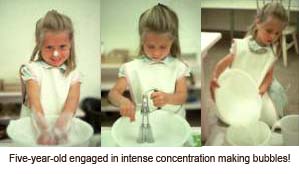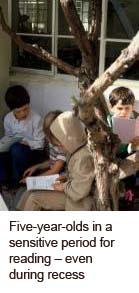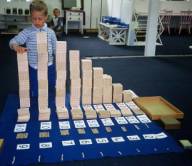Maria Montessori and the Sensitive
Periods in Development

What are these laws of development?
- There are successive stages the child passes through.
- Each stage has its unique characteristics that require specific environment and kinds of teaching.
- Each stage has one thing in common: each has its sensitive periods , or particular times when the child is attracted to certain activities in order for specific development to occur.
What exactly is a sensitive period?
- A special sensitivity that arouses a strong spontaneous desire to learn and master some skill or concept.
- A period of transitory and varying duration.
- A time especially devoted to the acquisition of a particular trait.
- Once that trait is acquired, the sensitivity disappears.
Adults have no direct influence on these periods. We cannot encourage them to begin nor can we command them to stop. All we can do it prepare an environment that encourages and nurtures spontaneous development.

A classic example of a sensitive period is the child acquiring speech.
He will begin when he is ready and once he begins, no amount of cajoling will cause the child to remain silent. He cannot stop because he is acting in accord with the very rhythms and cycles of the force of life. The child will pay particular attention to the human voice and mimic the sounds he hears. By babbling millions of sounds, he will eventually acquire speech. That speech will be whatever language the people around him speak, no matter how simple or complex it may be.
Recognizing sensitive periods
- You can recognize a sensitive period occurring when you see child your child developing a passion for a certain toy or activity.
- He may be trying to acquire balance and is drawn to walk on the cracks of sidewalks, or along the curb.
- She may be drawn to pick up small objects of any kind to develop the pincer grip.
- Your child will spontaneously repeat the activity again and again until one day the cycle is finished.
- The activity may not seem to be particularly meaningful to you, but it fulfills some area of mental or physical development and aware parents and caregivers will permit the activity.
 When the acquisition has been attained, the action or material that facilitated the development loses its fascination. The Montessori system is based on providing materials to suit these sensitive periods of spontaneous interest. You can do this at home too.
When the acquisition has been attained, the action or material that facilitated the development loses its fascination. The Montessori system is based on providing materials to suit these sensitive periods of spontaneous interest. You can do this at home too.
Missing a sensitive period by having no external activity to match internal development is like dropping a stitch in knitting.

If you drop a stitch, your garment is not as strong or beautiful as it might have been. More important than the eventual degree of perfection that may be reached, is the warping of being that occurs when a sensitive period is ignored or in some way blocked.
What happens when a sensitive period is blocked?
Maria Montessori believed that when a sensitive period is blocked, the child reacts to defend his internal growth and integrity.

Montessori explains that these examples of tantrums are the expression of alarm and the defense of inner development. The soul cries out in the only way it knows. The tantrum stops as soon as the possibility exists of satisfying the need.
Capricious tears?
Another example Montessori wrote about relates to a powerful desire for order, based on the child’s need to get oriented in the environment. There was a little toddler who loved her bath. The child was accustomed to being bathed in the family’s large kitchen sink. One day a babysitter bathed the child in the sink as she had been instructed. The child got hysterical. When the mother and sitter discussed it, they discovered that the mother always had her daughter seated facing the faucet, while the babysitter had placed her facing away from the faucet. This was enough to violate the toddler’s sense of order and she screamed in protest.
Fortunately, the sensitive periods are not always so dramatic! They can be almost unnoticed when the child’s environment adequately corresponds to his inner needs.
Psychological and educational value of the sensitive periods
Maria Montessori was the first to discover both the psychological importance and the overall importance to human development of the sensitive periods. When education is organized around the developing sensitive periods, children learn effortlessly with a sustained interest and enthusiasm almost unbelievable to observe. These sensitive periods relate to movement, language, math, sensory input, social graces and more.

This five-year-old chose to spend several hours doing this math work.
Why would he have done all this work without a powerful internal impetus?
The idea is to provide a prepared environment containing external activities that coincide with the needs of internal development. The child is permitted to freely choose his activities. As the “great match” of external activity with internal impetus occurs, the child’s every effort brings an increase in power . We often fail to recognize the significance and potential of these periods. Perhaps it is because we take for granted the stupendous progress we see children making every day.
The child’s work
The quality of the child’s work during the sensitive periods is far different than our work. We work to get the job done, whereas the child works because it provides inner satisfaction. He works because of the sheer joy of self-development.
Honoring the Work of the Child
As parents and caregivers the important thing is that we learn to recognize and honor the child’s work — which is his effort to build the man of tomorrow. Whenever we observe our child engaging in intelligent activity, we need to allow his cycle of activity to complete itself.
So, whether your child is learning to talk, spooning beans from one dish to another, walking on the cracks of the sidewalk to coordinate movement or practicing how to write the letters of the alphabet, one of your essential tasks is to simply allow the child to follow the inner impetus for learning. As we begin to notice and support the child’s spontaneous learning, the child truly becomes our teacher.